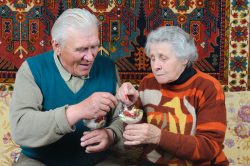 New research has shown that a compound produced by intestinal microbes is found in centenarians and protects them from some bacterial infections. The study from the Keio Univ. School of Medicine in Japan along with the Broad Institute of MIT and Harvard found that centenarians exhibited high levels of many species of bacteria. Some of those bacteria produce molecules called secondary bile acids which give the intestines protection from pathogens and support the immune system.
New research has shown that a compound produced by intestinal microbes is found in centenarians and protects them from some bacterial infections. The study from the Keio Univ. School of Medicine in Japan along with the Broad Institute of MIT and Harvard found that centenarians exhibited high levels of many species of bacteria. Some of those bacteria produce molecules called secondary bile acids which give the intestines protection from pathogens and support the immune system.
The researchers found that if a person is 100 years or older they are less prone to age-related chronic problems and can better survive infectious disease. This is because of their specific microbiome.
The research comprised of studying microbes from fecal samples of 160 centenarians that averaged 107 years old. The centenarians generated the secondary bile acids more than people aged 85-89 and between ages 21 and 55.
To find out just how the secondary bile acids work they used them to treat common bacteria that cause infection. This led to the discovery that the molecule, isoalloLCA, inhibits the multiplication of Clostridioides difficile, a bacterium that is resistant to bacterium which causes gut inflammation and diarrhea. The researchers then supplemented mice that had C. difficile with isoalloLCA and found it reduced the levels of the pathogen. The determination being that isoalloLCA can help maintain the body’s delicate balance of infectious microbiome in a gut that is healthy.
Future studies would be important to see what the relationship between longevity and these secondary bile acids. And, whether or not, these bile acids can be manipulated to be used on infections that are resistant to antibiotics. This would allow new therapeutics to be identified and used in their treatment.
To view the original scientific study click below:
Novel bile acid biosynthetic pathways are enriched in the microbiome of centenarians





